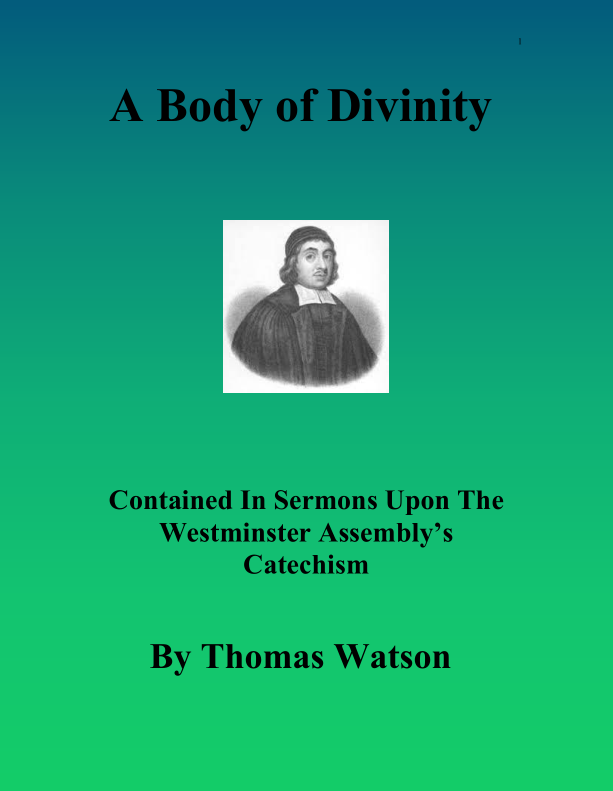By Thomas Watson

A Body of Divinity
Contained in Sermons upon The Westminster Assembly’s Catechism
By Thomas Watson
Who was Thomas Watson (1620-1686)? A Brief Overview of his Life and Work.
Discover the life and legacy of Thomas Watson, the Puritan preacher and author born around 1620 in Yorkshire. A diligent student at Emmanuel College, Cambridge, Watson demonstrated profound intellect in his writings, showcasing expertise in English, Hebrew, Greek, and Latin.
Watson’s sermons reflect a deep understanding of the biblical corpus, with cross-references spanning various texts. His knowledge extended beyond theology to history, botany, medicine, physics, classics, logic, and trades.
After serving at St. Stephen’s, Walbrook, London, Watson faced challenges during the Civil War due to his strong Presbyterian views. Imprisoned for opposing the execution of Charles I, he was released, resuming his pastoral duties until the Act of Uniformity in 1662 forced his ejection.
Despite adversity, Watson continued preaching in private and, after the Great Fire of London in 1666, established a place for public worship. With the Declaration of Indulgence in 1672, he obtained a license for Crosby Hall, Bishopsgate, where he ministered until 1680.
Watson’s unwavering commitment persisted until his sudden death in 1686 in Essex. His impactful works, marked by sound scriptural exposition, continue to bless those who seek profound insights into the Scriptures. Explore the enduring legacy of Thomas Watson through his timeless writings as you can find on this webpage.
About the book: “A Body of Divinity”,
It is a theological work by Thomas Watson that serves as a systematic exposition of Christian doctrine. The book is structured in a question-and-answer format, covering a wide range of theological topics. Here is an overview of the content found in “A Body of Divinity”:
Introduction and Preface: Watson provides an introduction to the purpose and structure of the book, setting the stage for the exploration of theological concepts.
Theology Proper: The book delves into the nature and attributes of God, exploring topics such as God’s existence, omnipotence, omniscience, and omnipresence.
The Doctrine of the Trinity: Watson discusses the biblical foundation for the doctrine of the Trinity, explaining the nature of God as Father, Son, and Holy Spirit.
The Covenant of Redemption: Watson explores the covenant made within the Godhead for the salvation of humanity, involving the roles of the Father, Son, and Holy Spirit in the plan of redemption.
The Covenant of Grace: The concept of God’s covenant with humanity is further developed, emphasizing the grace extended to believers through Christ.
The Person and Work of Christ: Watson examines the incarnation, life, death, resurrection, and ascension of Jesus Christ, emphasizing the soteriological significance of Christ’s work.
Effectual Calling and Regeneration: The book addresses the process by which individuals are called and regenerated by the Holy Spirit, leading to conversion and a new life in Christ.
Justification and Adoption: Watson explores the biblical doctrines of justification, whereby believers are declared righteous, and adoption, whereby they are welcomed into the family of God.
Sanctification and Perseverance: The ongoing process of sanctification and the assurance of believers’ perseverance in faith are discussed in this section.
The Means of Grace: Watson covers the various means by which God communicates His grace to believers, including the Word, sacraments, and prayer.
The Church and the Sacraments: The nature and significance of the Christian Church, as well as the administration of the sacraments, are explored.
The Last Things: The book concludes with a discussion of eschatological topics, including death, judgment, heaven, and hell.
“A Body of Divinity” is known for its clarity, scriptural grounding, and practical application of theological truths. It remains a valuable resource for those interested in Reformed theology and systematic theology in general.
Contents:
1. Brief Memoir Of Thomas Watson
2. A Preliminary Discourse To Catechising
3. Introduction
3.1. Man’s Chief End
3.2. The Scriptures
4. God and his creation
4.1. The Being Of God
4.2. The Knowledge Of God
4.3. The Eternity Of God
4.4. The Unchangeableness Of God
4.5. The Wisdom Of God
4.6 The Power Of God
4.7. The Holiness Of God
4.8. The Justice Of God
4.9. The Mercy Of God
4.10. The Truth Of God
4.11. The Unity Of God
4.12. The Trinity
4.13. The Creation
4.14. The Providence Of God
5. The fall
5.1. The Covenant Of Works
5.2. Adam’s Sin
5.3. Original Sin
5.4. Man’s Misery By The Fall
6. The covenant of grace and its mediator
6.1. The Covenant Of Grace
6.2. Christ The Mediator Of The Covenant
6.3. Christ’s Prophetic Office
6.4. Christ’s Priestly Office
6.5. Christ’s Kingly Office
6.6. Christ’s Humiliation In His Incarnation
6.7. Christ’s Exaltation
6.8. Christ The Redeemer
7. The application of redemption
7.1. Faith
7.2. Effectual Calling
7.3. Justification
7.4. Adoption
7.5. Sanctification
7.6. Assurance
7.7. Peace
7.8. Joy
7.9. Growth In Grace
7.10. Perseverance
8. Death and the last day
8.1. The Death Of The Righteous
8.2. A Believer’s Privilege At Death
8.3. The Resurrection
’If ye continue in the faith grounded and settled.’ – Col 1:13.
Intending next Lord’s day to enter upon the work of catechising, it will not be amiss to give youapreliminary discourse, to show you how needful it is for Christians to be well instructed inthegrounds of religion. ‘If ye continue in the faith grounded and settled.’
I. It is the duty of Christians to be settled in the doctrine of faith.
II. The best way for Christians to be settled is to be well grounded.
Looking for a Hardcover or Paperback?
For those who want to have a hardcover or a paperback of this book. I want to suggest you to look here (paperback) or here (paperback and hardcover)